Related Research Articles

Kenesaw Mountain Landis was an American jurist who served as a United States federal judge from 1905 to 1922 and the first Commissioner of Baseball from 1920 until his death. He is remembered for his handling of the Black Sox Scandal, in which he expelled eight members of the Chicago White Sox from organized baseball for conspiring to lose the 1919 World Series and repeatedly refused their reinstatement requests. His firm actions and iron rule over baseball in the near quarter-century of his commissionership are generally credited with restoring public confidence in the game.
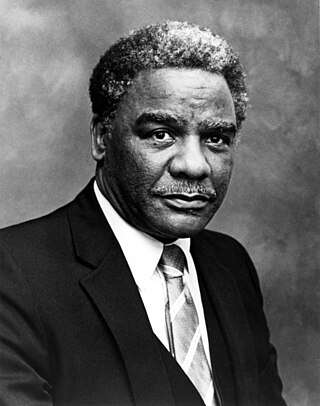
Harold Lee Washington was an American lawyer and politician who was the 51st Mayor of Chicago. Washington became the first African American to be elected as the city's mayor in April 1983. He served as mayor from April 29, 1983 until his death on November 25, 1987. Born in Chicago and raised in the Bronzeville neighborhood, Washington became involved in local 3rd Ward politics under Chicago Alderman and future Congressman Ralph Metcalfe after graduating from Roosevelt University and Northwestern University School of Law. Washington was a member of the U.S. House of Representatives from 1981 to 1983, representing Illinois's first district. Washington had previously served in the Illinois State Senate and the Illinois House of Representatives from 1965 until 1976.
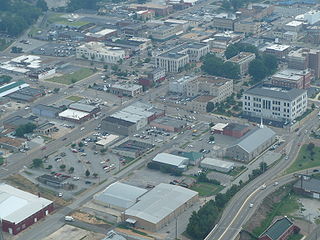
Jackson is a city in and the county seat of Madison County, Tennessee. Located 70 miles (110 km) east of Memphis, it is a regional center of trade for West Tennessee. Its total population was 68,205 as of the 2020 United States census. Jackson is the primary city of the Jackson, Tennessee metropolitan area, which is included in the Jackson-Humboldt, Tennessee combined statistical area. Jackson is Madison County's largest city, and the second-largest city in West Tennessee next to Memphis. It is home to the Tennessee Supreme Court's courthouse for West Tennessee, as Jackson was the major city in the west when the court was established in 1834.
The color line, also known as the color barrier, in American baseball excluded players of black African descent from Major League Baseball and its affiliated Minor Leagues until 1947. Racial segregation in professional baseball was sometimes called a gentlemen's agreement, meaning a tacit understanding, as there was no written policy at the highest level of organized baseball, the major leagues. A high minor league's vote in 1887 against allowing new contracts with black players within its league sent a powerful signal that eventually led to the disappearance of blacks from the sport's other minor leagues later that century, including the low minors.

Austin is one of 77 community areas in Chicago Located on the city's West Side, it is the third largest community area by population and the second-largest geographically. Austin's eastern boundary is the Belt Railway located just east of Cicero Avenue. Its northernmost border is the Milwaukee District / West Line. Its southernmost border is at Roosevelt Road from the Belt Railway west to Austin Boulevard. The northernmost portion, north of North Avenue, extends west to Harlem Avenue, abutting Elmwood Park. In addition to Elmwood Park, Austin also borders the suburbs of Cicero and Oak Park.

James Curtiss was an American politician who twice served as Mayor of Chicago, Illinois for the Democratic Party.
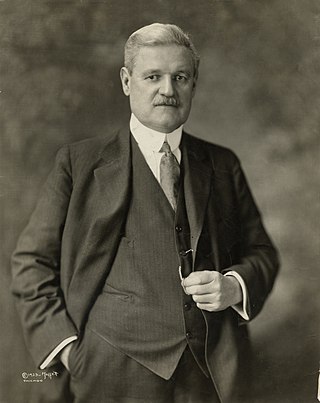
William Emmett Dever was the mayor of Chicago from 1923 to 1927. He had previously served as a judge and before that an alderman. As an alderman and judge he would work to become the Democratic candidate for mayor for over two decades.

The Alpha Suffrage Club was the first and most important black female suffrage club in Chicago and one of the most important in Illinois. It was founded on January 30, 1913 by Ida B. Wells with the help of her white colleagues Belle Squire and Virginia Brooks. The Club aimed to give a voice to African American women who had been excluded from national suffrage organizations such as the National American Women Suffrage Association (NAWSA). Its stated purpose was to inform black women of their civic responsibility and to organize them to help elect candidates who would best serve the interests of African Americans in Chicago.

Robert Lindblom Math & Science Academy High School (LMSA) is a public 4–year selective enrollment high school and middle school located in the West Englewood neighborhood on the south side of Chicago, Illinois, United States. Lindblom is operated by the Chicago Public School system. The school originally constructed in 1919 is named for Robert Lindblom, a nineteenth-century Swedish–born trader on the Chicago Board of Trade.
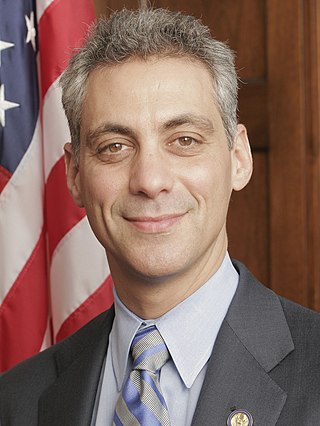
The city of Chicago, Illinois held a nonpartisan mayoral election on Tuesday, February 22, 2011. Incumbent Mayor Richard Michael Daley, a member of the Democratic Party who had been in office since 1989, did not seek a seventh term as mayor. This was the first election since 1947 in which an incumbent mayor of Chicago did not seek reelection.

A special election for Illinois' 2nd congressional district was held on April 9, 2013, to fill a seat in the United States House of Representatives for Illinois's 2nd congressional district, after Representative Jesse Jackson Jr. resigned on November 21, 2012. The special election was required to be held within 115 days of Jackson's resignation. It was won by Democratic candidate Robin Kelly, formerly the Chief Administrative Officer of Cook County.
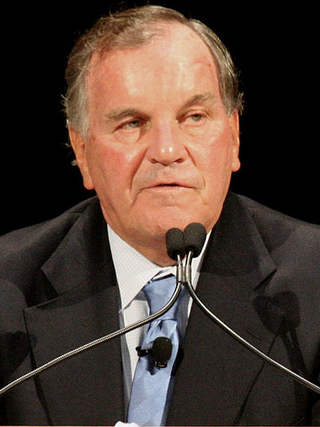
The Chicago mayoral election of 1989 saw Democratic nominee Richard M. Daley win election to the remainder of an unexpired mayoral term with a 14% margin of victory. This marked a return for the Daley family to the office of mayor. Daley was elected over Alderman Timothy Evans, the nominee of the newly formed Harold Washington Party, and the Republican nominee Ed Vrdolyak.
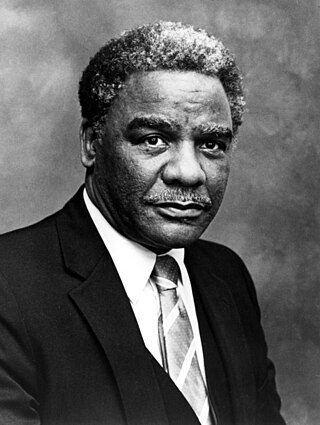
The Chicago mayoral election of 1983 was first the primary on February 22, 1983, which was followed by the general on April 12, 1983. The election saw the election of Chicago, Illinois' first African-American mayor, Harold Washington. Incumbent Mayor Jane Byrne, who had served since April 16, 1979 had lost re-nomination in the Democratic primary in a three-way race between herself, then–Congressman Washington, and then–State's Attorney Richard M. Daley in February 1983. Washington would face off against Republican nominee Benard Epton, winning with a 3.7% lead over Epton in the general election.
The Cook County Bar Association (CCBA), the nation's oldest association of African-American lawyers and judges, was founded in Illinois in 1914. Arkansas attorney Lloyd G. Wheeler, moved to Illinois in 1869 to practice law and he, along with 31 other Black lawyers, began to meet informally to plan protests against discrimination in hotels, theaters, and restaurants, and to address judicial elections and school desegregation. Among the group of Black lawyers was Ida Platt, the first Black woman admitted to practice in the State of Illinois, and the third Black woman lawyer in the nation. This informal collaboration lasted until 1914, when a younger generation of lawyers decided to form the Cook County Bar Association. Edward H. Wright was elected the first CCBA president. On March 5, 1920, the CCBA was formally incorporated by the State of Illinois.
The Chicago Defender is a Chicago-based online African-American newspaper. It was founded in 1905 by Robert S. Abbott and was once considered the "most important" newspaper of its kind. Abbott's newspaper reported and campaigned against Jim Crow-era violence and urged black people in the American South to settle in the north in what became the Great Migration. Abbott worked out an informal distribution system with Pullman porters who surreptitiously took his paper by rail far beyond Chicago, especially to African American readers in the southern United States. Under his nephew and chosen successor, John H. Sengstacke, the paper dealt with racial segregation in the United States, especially in the U.S. military, during World War II. Copies of the paper were passed along in communities, and it is estimated that at its most successful, each copy was read by four to five people.

Ferdinand Lee Barnett was an American journalist, lawyer, and civil rights activist in Chicago, Illinois, beginning in the late Reconstruction era.

Dorsey Ryan Crowe was an American politician who served as alderman of Chicago's 21st ward from 1919 to 1923 and upon its redistricting into the 42nd ward from 1923 to his death. A Democrat serving most of the Near North Side, he represented such affluent constituencies as the Gold Coast and Streeterville as well as such poor areas as Cabrini–Green and Goose Island. At the time of his death he was the Dean of the Chicago City Council, as well as the last alderman from the era of partisan aldermanic elections and when wards elected two aldermen each. An alderman for 43 years, and the last to have served under a Republican mayor, he is as of 2018 the third-longest serving alderman in Chicago history, behind Ed Burke of the 14th ward and John Coughlin of the 1st.

Louis Bernard Anderson was an American politician who served as alderman of Chicago's 2nd ward from 1917 to 1933. A Republican, he served most of the Douglas community area, including much of the African-American neighborhood of Bronzeville. He was a prominent ally of mayor William Hale Thompson, and served as his floor leader throughout the 1920s.

Robert Shaw was an American politician. He served as a City of Chicago Alderman in the 9th ward for two terms, first in 1979 through 1983 and again from 1987 until 1998. Shaw also served as commissioner on the Cook County Board of Review from 1998 until 2004.

Charles C. P. Holden was an American politician who served as President of the Cook County Board of Commissioners and served as the president of the Chicago Common Council. He ran unsuccessfully for mayor of Chicago in the 1871 election.
References
- 1 2 Robert R. Jackson. American national biography online. Oxford University Press. 2000. OCLC 1003238948 . Retrieved 2022-03-08.
- 1 2 3 Williams, Erma Brooks (2008). Political Empowerment of Illinois' African-American State Lawmakers from 1877 to 2005. University Press of America. p. 6. ISBN 978-0-7618-4018-3.
- 1 2 3 4 "The Broad Ax 5 August 1916 — Illinois Digital Newspaper Collections". idnc.library.illinois.edu.
- 1 2 3 "Major Robert R. Jackson; Residence of Major and Mrs. Jackson; 3366 South Park Avenue". NYPL Digital Collections. Retrieved 2022-03-08.
- ↑ Scott, Ellen C. (2012). "Black "Censor," White Liberties: Civil Rights and Illinois's 1917 Film Law". American Quarterly. 64 (2): 219–247. doi:10.1353/aq.2012.0019. ISSN 0003-0678. JSTOR 23273515. S2CID 143939578.